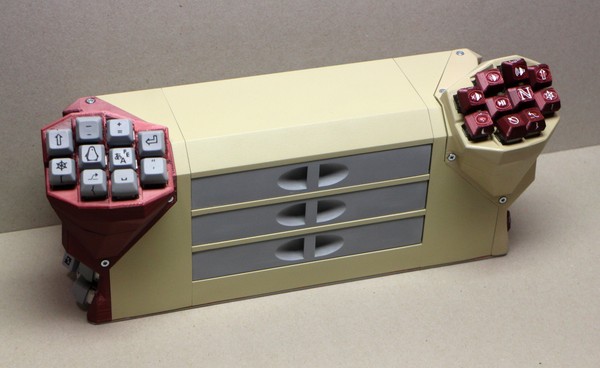This is a CAD program for designing a keyboard that suits you. By editing text files of parameters, you can change:
- Switch type: ALPS, Kailh (PG1511) or MX.
- Microcontroller type: Lots of options.
- Size and shape.
- Row and column curvature and tilt (tenting).
- Exceptions at any level, down to the position of individual keys.
- Minor features like LED strips and wrist rests.
Here are two of the application’s bundled designs for concave, columnar, ergonomic keyboards, as examples of what you can do:
⤤ The Concertina, a diploid keyboard with 20 thumb keys and 3 assortment drawers.
⤤ The original, split DMOTE keyboard, short for “Dactyl-ManuForm, Opposable Thumb Edition”.
To get started, try the introduction, part of the project’s documentation.
This project, the DMOTE application, is a fork of Tom Short’s Dactyl-ManuForm. It’s one of many forks in the Dactyl genus.
There’s a small family of accessory projects:
dmote-keycap: A library used directly by the DMOTE application to model both featureless maquettes for use in easily rendered previews, and “minimal” keycaps you can print and use to save space.dmote-topography: Smooth organic topography for height maps you can use as wrist rests, including the example bundled in the resource folder of this project.dmote-drawer: Assortment drawers for the Concertina, a bundled keyboard design.dmote-beam: Configurable clips for stabilizing a split keyboard by holding a connecting rod between the two halves.
Like its parent, the DMOTE project is based on Matthew Farrell’s
scad-clj. A second small family of
general CAD libraries for scad-clj have grown up around the DMOTE project.
scad-app: A simple way to turnscad-cljspecifications into applications, stripping out some boilerplate. See alsocad-template, which is all boilerplate for starting new CAD projects that are ready to render.scad-tarmi: Commonplace abstractions.scad-klupe: Threaded fasteners.
Copyright © 2015–2020 Matthew Adereth, Tom Short, Viktor Eikman et al.
The source code for generating the models (everything excluding the things/ and resources/ directories) is distributed under the GNU AFFERO GENERAL PUBLIC LICENSE Version 3. The generated models and PCB designs are distributed under the Creative Commons Attribution-NonCommercial-ShareAlike License Version 3.0.

